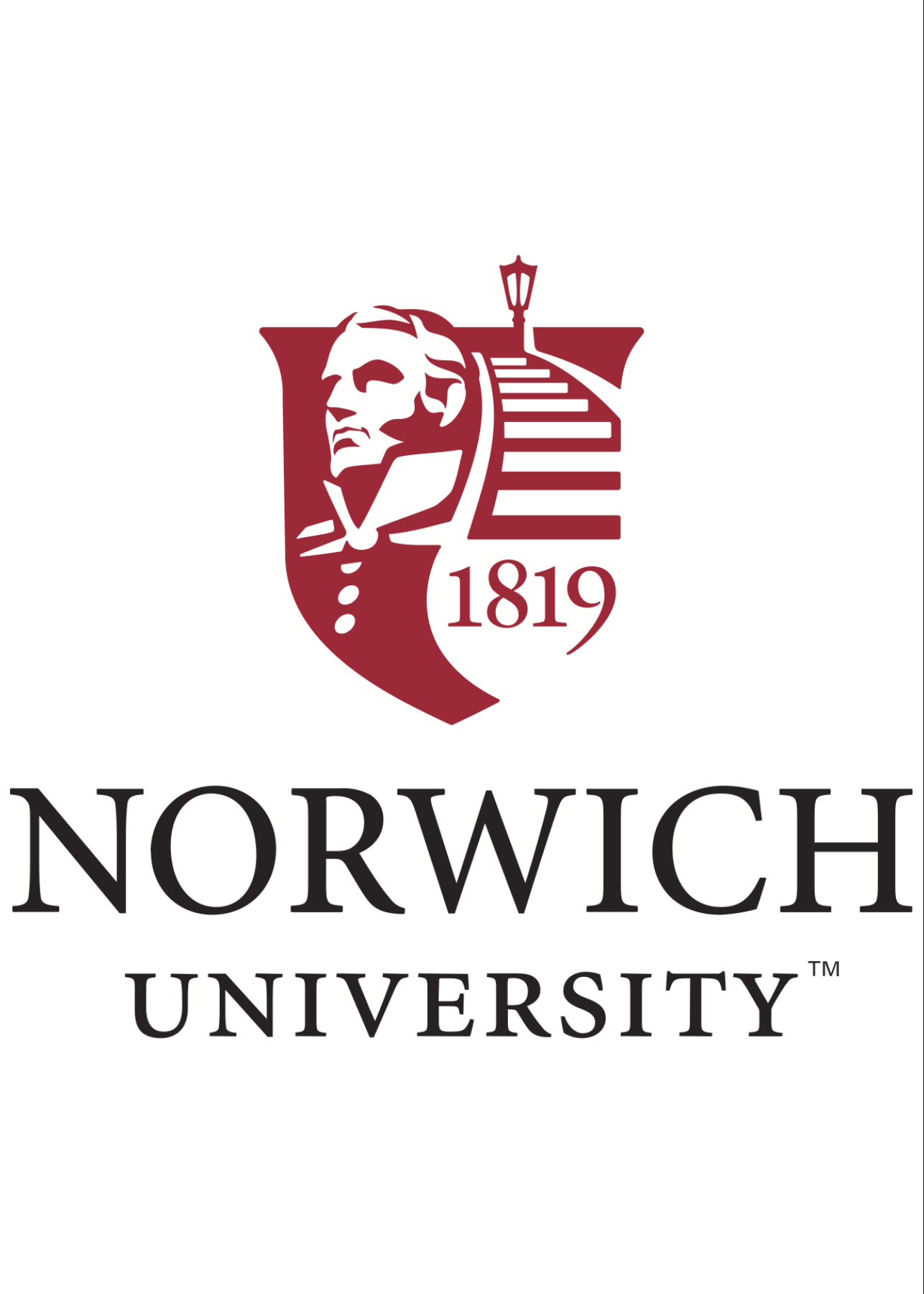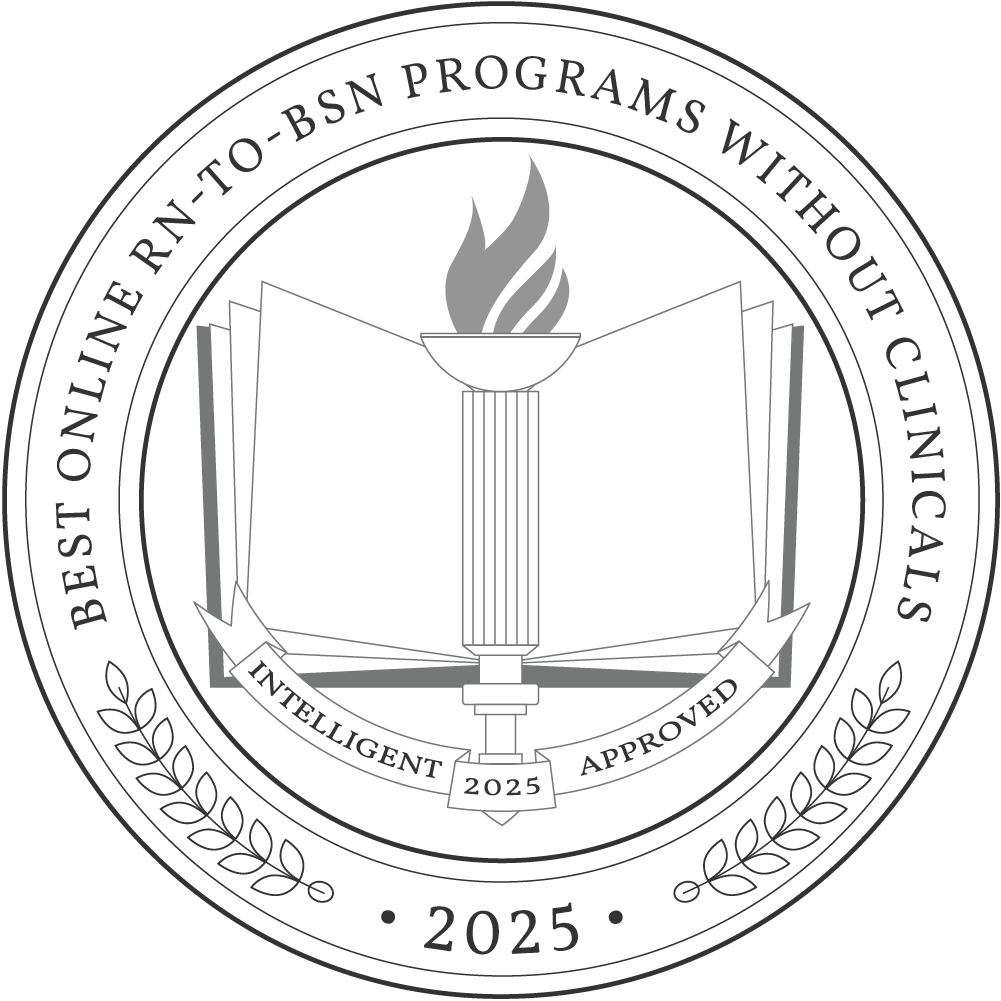If you are already a registered nurse, you may have wondered what is involved in continuing your education. The nursing field offers a wide range of educational opportunities, from associate degrees up to doctoral programs. One common program is the RN-to-BSN option, which allows you to earn your bachelor’s degree in nursing while working as a nurse.
Although every program is different, finding some that do not require clinical experience is possible. These are most common if you already have experience in the healthcare world. The state or your school may determine clinical requirements, and they vary greatly depending on where you live.
Intelligent.com compiled this list to help students find quality RN-to-BSN degree programs that don’t require clinicals. We also spoke to Blanca Villagomez, a program coordinator and counselor at UC-Irvine, for her insight into choosing an online RN-to-BSN degree program.
Why Trust Us
The Intelligent.com Higher Education Team is dedicated to providing students with independent, equitable school and program rankings and well-researched resources. Our expert-driven articles cover topics related to online colleges and programs, paying for school, and career outlooks. We use data from the U.S. Department of Education’s College Scorecard, the National Center for Education Statistics, and other reputable educational and professional organizations. Our academic advisory team reviews content and verifies accuracy throughout the year for the most current information. Partnerships do not influence rankings or editorial decisions.
- Analyzed over 2,000 national, accredited, and nonprofit colleges and universities
- 800+ rankings pages are reviewed and updated yearly
- Content is informed by reputable sources, surveys, and interviews with academic advisors and other experts
- Over 100 data points are reviewed for accuracy and quality throughout the year, including sources
How we rank schools
Our list features the best Online RN-To-BSN Degree Programs without Clinicals degree programs at top colleges nationwide. Each school featured is a nonprofit, accredited institution — either public or private — with a high standard of academic quality for post-secondary institutions.
We evaluated each school’s program on tuition costs, admission, retention and graduation rates, faculty, reputation, and the student resources provided for online students. We collected data from trusted sources like the National Center for Education Statistics, individual school and program websites, school admissions counselors, and other data sources. Then, we calculated the Intelligent Score on a scale of 0 to 100 based on the following criterion:
Academic Quality:
- Admission rate versus enrollment rate
- Retention rate of students who return after year one
- Accreditation status (regional and programmatic)
- Nonprofit status, both private and public institutions
Graduation Rate
- Overall graduation rate
- Total number of currently enrolled students, including diversity metrics
- Student-to-faculty ratio
Cost and ROI
- In-state and out-of-state per-credit tuition rates and fees
- Required credits to graduate
- Earning potential after graduation
- Availability of federal student loans, scholarships, and other financial aid options
Student Resources
- Available student services for online-only and hybrid programs
- On-campus amenities like tutoring centers and the number of libraries
Read more about our ranking methodology.
Best 10 Online RN to BSN Programs without Clinicals
FiltersInstitution Type
Status
- Intelligent Score
- Alphabetically By University Name
- Acceptance Rate
- Enrollment
- In-state Graduate Tuition
- Out-of-state Graduate Tuition
- In-state Undergraduate Tuition
- Out-of-state Undergraduate Tuition

Clarkson College
Intelligent Score: 99.11In-state: $14,119
Out-of-state: $14,119
In-state: $17,121
Out-of-state: $17,121
SAT: 1190 and 1370
ACT: 25-30
$335
Online
Accreditation Commission for Education in Nursing
121

Oklahoma City University
Intelligent Score: 97.69In-state: $28,094
Out-of-state: $28,094
In-state: $10,620
Out-of-state: $10,620
SAT: 1080-1263
ACT: 22-29
$390
Online
Accreditation Commission for Education in Nursing
124

University of Massachusetts Boston
Intelligent Score: 95.87In-state: $15,791
Out-of-state: $35,779
In-state: $14,014
Out-of-state: $14,014
SAT: 1200-1390
ACT: 27-32
$370
Online
American Nurses Credentialing Center
120

Nebraska Methodist College
Intelligent Score: 94.60In-state: $33,309
Out-of-state: $33,309
In-state: $37,225
Out-of-state: $37,225
SAT: 1140
ACT: 22
$320
Online
Commission on Collegiate Nursing Education
127

Franklin University
Intelligent Score: 93.93In-state: $9,552
Out-of-state: $9,552
In-state: $16,080
Out-of-state: $16,080
SAT: N/A
ACT: N/A
$298
Online
Commission on Collegiate Nursing Education
120

St. Petersburg College
Intelligent Score: 91.45In-state: $19,485
Out-of-state: $26,089
In-state: NA
Out-of-state: NA
SAT: Not Required
ACT: Not Required
In-State: $123
Out-of-State: $426
Online
Commission on Collegiate Nursing Education
121

Norwich University
Intelligent Score: 90.76In-state: $40,608
Out-of-state: $40,608
In-state: $18,614
Out-of-state: $18,614
SAT: N/A
ACT: N/A
$375
Online
Commission on Collegiate Nursing Education
120

Herzing University
Intelligent Score: 89.63In-state: $34,284
Out-of-state: $34,284
In-state: $31,984
Out-of-state: $31,984
SAT: 1,275 or better
ACT: 17 or better
$430
Online
Commission on Collegiate Nursing Education
120

Missouri Baptist University
Intelligent Score: 88.85In-state: $27,946
Out-of-state: $27,946
In-state: $10,256
Out-of-state: $10,256
SAT: 840-1050
ACT: 18-23
$350
Online
National League for Nursing Commission for Nursing Education Accreditation
120

Appalachian State University
Intelligent Score: 87.59In-state: $4,242
Out-of-state: $19,049
In-state: $4,839
Out-of-state: $4,839
SAT: 1070-1240
ACT: 22-27
Resident: $177
Non-Resident: $911
Online
Commission on Collegiate Nursing Education
120
What You Can Expect From an Online RN-to BSN Program
An RN-to-BSN program is a completion program for registered nurses who have a diploma or associate degree in nursing from an accredited college and want to earn their bachelor’s degree in nursing. Exact parameters vary by program, but in most cases, students can transfer up to 90 credits from previous postsecondary education, allowing them to earn their bachelor’s degree faster than they would in a traditional program.
The curriculums for these programs generally cover intermediate and advanced nursing skills and practices, including research, health promotion, patient care technology, and safety and quality within the healthcare system. Because students in these programs have already passed their National Council Licensure Exam (NCLEX) and have experience working in clinical settings, they may waive clinical rotation requirements, common in BSN programs.
How a program is delivered can also impact what students expect from their online RN-to-BSN program. “Online programs generally offer instruction through asynchronous or synchronous modalities, so expectations and pacing can vary greatly across courses,” Villagomez says. “With asynchronous courses, interactions with professors and classmates can be limited and may require more effort to stay connected. Meanwhile, synchronous courses can facilitate engagement more easily. Regardless of modality, all online degree programs require high self-motivation, effective time management, and structured independent study.”
Potential courses you’ll take in an online RN-to-BSN degree program
- Professional Nursing Theory: Analyzes the multiple dimensions of contemporary professional nursing.
- Health Promotion Across the Lifespan: Examines concepts and theories involved in health promotion across the lifespan and their application for nurses.
- Nursing Management in Healthcare: Explores selected theories and concepts of organizational behavior and the management of people and resources, with a focus on the application of these theories and concepts to nursing practice and health care systems.
- Innovation in Nursing: Examines the role and behaviors of an innovator in the nursing profession.
What Can I Do With an Online RN-to-BSN Degree?
Nurses with a bachelor’s degree are far more hirable than those with just an associate degree or nursing diploma. Some employers will only hire nurses with a BSN, and the pay rate, in general, is higher. According to the American Nursing Association (ANA), nurses with a BSN earn an average annual salary of $92,000, compared to $75,000 for those with an ADN.
One way to ensure you are well-placed for job advancement is to consider a particular focus as you plan your courses. You could, for example, specialize in pediatric nursing, public health nursing, or critical care nursing. You might also become a clinical nurse specialist (CNS), which allows you to provide direct patient care in a nursing specialty such as psychiatric and mental health nursing.
A BSN degree can be a stepping stone to further education and career advancement. For example, nurses who earn a Master of Science in Nursing (MSN) can become nurse anesthetists, nurse midwives, or nurse practitioners. For those who want to pursue non-clinical roles, a master’s in healthcare administration or health informatics can lead to high-level management positions.
Nurses with a Ph.D., meanwhile, can play vital roles in the nursing field. They may serve as managers or directors of nursing units, nurse practitioners, or professors at the university level.
Career outlook
- Registered nurses: Provide and coordinate patient care, educate patients and the public about various health conditions, and provide advice and emotional support to patients and their families.
- Median annual salary: $86,070
- Projected employment growth (through 2032): 6%
- New jobs projected: 194,500 per year
- Health education specialists: Teach people about behaviors that promote wellness by assessing the health needs of individuals and communities, developing programs, materials, and events to teach people about health topics, and evaluating the effectiveness of programs and educational materials
- Median annual salary: $62,860
- Projected employment growth (through 2032): 7%
- New jobs projected: 6,700 per year
- Nurse practitioners: After earning a master’s degree, RNs can obtain licensure as nurse practitioners or advanced practice registered nurses. These individuals serve as primary and specialty care providers, delivering advanced nursing services to patients and their families. In most states, they can prescribe medications, order medical tests, and diagnose health problems.
- Median annual salary: $126,260
- Projected employment growth (through 2032): 40%
- New jobs projected: 31,900 per year
How to Choose an Online RN-to-BSN Program Without Clinicals
Clarify your goals and priorities
“Choosing the right RN-to-BSN program can shape your future career and educational path,” Villagomez says. “Therefore, it’s important to reflect on your motivations for pursuing a degree and what you are passionate about learning. Consider your long-term career goals and how this degree will help you achieve them.”
One consideration is whether there is an area of nursing you want to specialize in, such as pediatrics, neonatal care, oncology, or psychiatric nursing. This will help you focus on programs that offer concentrations in this type of nursing.
Also, review the licensure requirements for the state in which you plan to practice to ensure you’re considering programs that meet eligibility criteria.
Another parameter to set at this stage is the type of program you want, including synchronous or asynchronous content delivery and full- or part-time enrollment.
Says Villagomez, “Ultimately, you’ll need to choose a program that aligns with your interests, budget, and goals so that you possess the knowledge and skills needed to succeed in your future career.”
Research schools and programs
Establishing clear parameters will help you narrow your options once you start exploring schools and programs.
An essential piece of information to gather when researching schools is whether they have institutional and programmatic accreditation.
“With institutional accreditation, colleges and universities are evaluated as a whole and must meet several quality standards to receive regional or national accreditation,” Villagomez says. “Meanwhile, programmatic accreditation evaluates the quality and legitimacy of the specific degree programs. Attending a non-accredited college can negatively impact future post-graduate opportunities, including employment, licensure, and graduate programs.”
Nursing degree programs are accredited by the Accreditation Commission for Education in Nursing (ACEN), while schools are accredited by agencies recognized by the Council on Higher Education Accreditation (CHEA).
Once you’ve confirmed that the schools and programs you’re considering are accredited, you can dig deeper by gathering the following information:
- What the curriculum consists of, including core courses, electives, and specialization options
- How courses are delivered (synchronously or asynchronously)
- Faculty credentials
- Available support services for online students, including tutoring, counseling, tech support, library resources, and networking opportunities
- Program costs, including fees
This information is usually available on a school’s website. Students can also learn more about programs by contacting the school’s admissions office or attending virtual open houses and information sessions.
Prepare for tests and applications
“After researching degree programs and schools, students should have a strong sense of the admission requirements,” Villagomez says. “Because requirements usually vary by school, students must stay organized with a comprehensive and detailed checklist to track their progress, submit all required materials, and meet deadlines.”
To be eligible for an RN-to-BSN program without clinicals, students will likely need to have completed clinical work in their previous educational efforts or worked as registered nurses for at least a year in a clinical nursing setting. When applying to programs, they will likely need proof that they have completed these requirements.
Additional eligibility criteria for these programs include passing the NCLEX, having an active nursing license, and completing prerequisite coursework.
A standard application for an RN-to-BSN degree includes:
- Completed application and required fees
- Official transcripts from previously attended colleges
- Letters of recommendation
- Personal statement or essay
- Resume or CV
- SAT or ACT scores
Determine how you’ll pay for your degree
While researching schools, get as much information as possible about the program’s full cost (including fees) and the financial aid options available to you.
There are two forms of financial aid — need-based and merit-based. For need-based aid, students must complete the Free Application for Federal Student Aid (FAFSA). Need-based aid includes federal student loans, grants, scholarships, work-study, and assistantships.
Schools and external organizations will also consider students for merit-based aid like scholarships, grants, and fellowships based on their achievements and aptitudes.
If you are working while earning your BSN, find out if your employer offers tuition assistance benefits, which can help offset educational costs. Active-duty military members and veterans may be able to get discounted tuition or use GI Bill benefits to pay for their degrees.
Online RN-to-BSN Programs Without Clinicals Frequently Asked Questions
Should I earn an RN-to-BSN degree online or in-person?
Whether you pursue an RN-to-BSN degree online or in person depends on personal preferences and needs.
For students prioritizing flexibility, an online program may be the best option. These programs are often designed for those with full-time jobs or family commitments. Many programs operate asynchronously, allowing students to complete coursework and assignments according to their own availability.
However, online programs, especially asynchronous ones, often require more motivation and dedication than traditional in-person programs. Students must be prepared to dedicate time and effort to their studies to stay on track and get the most out of their program.
It’s also important to consider learning styles and preferences. Online courses are typically delivered through pre-recorded lectures, videos, and reading assignments, which may not be a good fit for students who learn best through hands-on assignments and real-time interaction with instructors and classmates.
How much does an online RN-to-BSN degree program cost?
Specific tuition costs and fees vary by program and school. Students should always consult a financial aid counselor for the most accurate information about program costs and payment options.
According to the National Center for Education Statistics (NCES), during the 2022-23 academic year, the average annual tuition for undergraduate programs was $9,750 at public institutions and $38,421 at private colleges.
Many factors influence how much students will pay for an online RN-to-BSN degree. For example, students attending a public institution should note whether the school has different tuition rates for in-state and out-of-state students or if distance learners all pay the same tuition rate. Many schools charge additional fees for virtual classroom technology, labs, background checks, or other resources, which students must factor into their budgets.
However, because these programs are geared towards students already working as nurses, it may be easier to maintain a job and steady income while enrolled.
How long does it take to earn an online RN-to-BSN degree?
Program duration for an RN-to-BSN degree varies based on the required number of credits and the student’s enrollment status. Programs that require 120 credits can typically be completed in four years of full-time study or 5-6 years of part-time study.
Students who have previously earned credits from an associate degree or diploma program can typically apply those credits to their BSN, decreasing the overall amount of time it takes to complete their BSN degree. These are commonly known as degree completion programs and can help students earn their BSN faster.
Is an online RN-to-BSN degree worth it?
“Earning an online nursing degree can be a convenient and flexible way to pursue higher education,” Villagomez says. “However, the value of an online degree can depend on various factors, such as the reputation of the school and the program, student support services, the accreditation of the degree, and the specific career or educational path students are pursuing.”
From a career perspective, the demand for nurses will continue steadily through the next decade. This is driven by an increase in the elderly population and a need to replace RNs who retire, switch careers, or move to advanced positions. The BLS reports that there will be an average of 194,500 new openings for RNs every year through 2032.
RNs with a BSN can also expect a higher salary, which is also determined partly by setting and location. The ANA reports that RNs with a BSN earn an average annual salary of $92,000. Meanwhile, RNs with an ADN earn an average annual salary of $75,000.
Students should also consider changes in the industry to address pay inequities. In recent years, nurses and healthcare workers throughout the U.S. have taken action, including striking, to demand better pay and working conditions amid changes in the healthcare industry.


